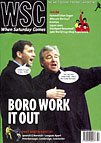 Tottenham wasted ten years under the stewardship of Alan Sugar, says Adam Powley. But there is no guarantee his successors will be any better
Tottenham wasted ten years under the stewardship of Alan Sugar, says Adam Powley. But there is no guarantee his successors will be any better
It says something about the sentimentality of football fans that when Alan Sugar called it quits at White Hart Lane, Spurs supporters were in conciliatory mood. Having finally seen the man so long identified with the club’s decline speak in such an apparently convincing manner about his “sad failure”, many felt a tinge of regret at his decision. Even Save Our Spurs, the pressure group most readily identified with opposition to Sugar, paid generous tribute to his tenure at the club.
Was this a case of Tottenham fans changing their minds – more grist to the mill for those who call them fickle? Not quite. The more virulent criticism aimed at Sugar tended to arise spontaneously only when the team he helped to engineer were doing their level best to perform like the Keystone Cops, and groups like SOS were at pains to distance themselves from the personal abuse aimed Sugar’s way.
Their reaction does hint, however, that there is a sense of unease over what lies ahead. The phrase “better the devil you know” keeps cropping up in conversation. In helping to remove Sugar for investment group ENIC to take his place, have we simply swapped a dictatorial businessman for a faceless corporate body even more keen to return a healthy balance sheet? Time will tell, but amid half-truths and misrepresentations, the story of how Tottenham fans came to fall out with their chairman has been distorted.
The first thing to consider is the claim that Alan Sugar saved Spurs. It is true that he came in at a time when the club was at a low ebb, but it is highly unlikely it would actually have gone under. The fans’ continuing support ensured its survival and enabled Sugar’s initial investment of around £8 million to almost triple. The value of this stake soared, not thanks to further investment by Sugar, but because of the general football boom of the 1990s.
That is the crucial point. When Sugar took over, Spurs were one of the “big five”. Now, at a time when the game at the top end is in buoyantly rude health, we are among the also-rans, lagging ever further behind Man Utd and Arsenal. Spurs, with a‑substantial fan base, a tradition of winning cups (if not championships) and a considerable European pedigree, were perfectly placed to cement a position among the emerging elite. That it has declined so miserably is an indictment of Sugar’s reign.
Sugar ultimately paid for past mistakes, wasting money on poor players bought by poorly chosen managers. A PR disaster who labelled fans as “morons” and foreign players as “Carlos Kick-a-balls”, he damaged Tottenham’s reputation and has never been able to recover. The irony is that just when it seemed he was adopting a more realistic policy towards spending and nurturing home grown talent – the Man Utd model – he should decide to sell up. Such common sense has come too late.
It is also necessary to point out, however, that Tottenham fans are not simply demanding the new owners throw money at the team as if that will solve everything. Our consistent complaint is not that money hasn’t been invested – far from it. But the £100 million quoted by Sugar represents a waste of resources. Spurs fans, believe it or not, do not want to go down the road travelled by clubs like Chelsea, Newcastle and even Middlesbrough. Each of these has adopted a high-risk, high-spending strategy to achieve success with distinctly limited results. It will also be interesting to see how Leeds, aided by a fawning media and fuelled by a chairman who apparently can’t stay out of the spotlight, succeed with their ambitious plans.
The frustration for Tottenham supporters is that we were better placed than all these clubs to benefit from football’s boom. Instead we have laboured even to stay in mid-table, just at a time when expectations have been raised. Sugar was both the victim and cause of these heightened ambitions, claiming in one breath that he had saved “Del Boy’s stall” only to promise the championship in three years with the next, while raising ticket prices to extortionate levels.
If ENIC’s Daniel Levy really is a Tottenham fanatic, he should learn from Sugar’s mistakes and appreciate the club’s true worth. The problem for Levy is that he has further to go in playing catch-up – and though money is essential, it is far from being the whole solution. Restoring Tottenham's reputation is another matter entirely.
From WSC 168 February 2001. What was happening this month